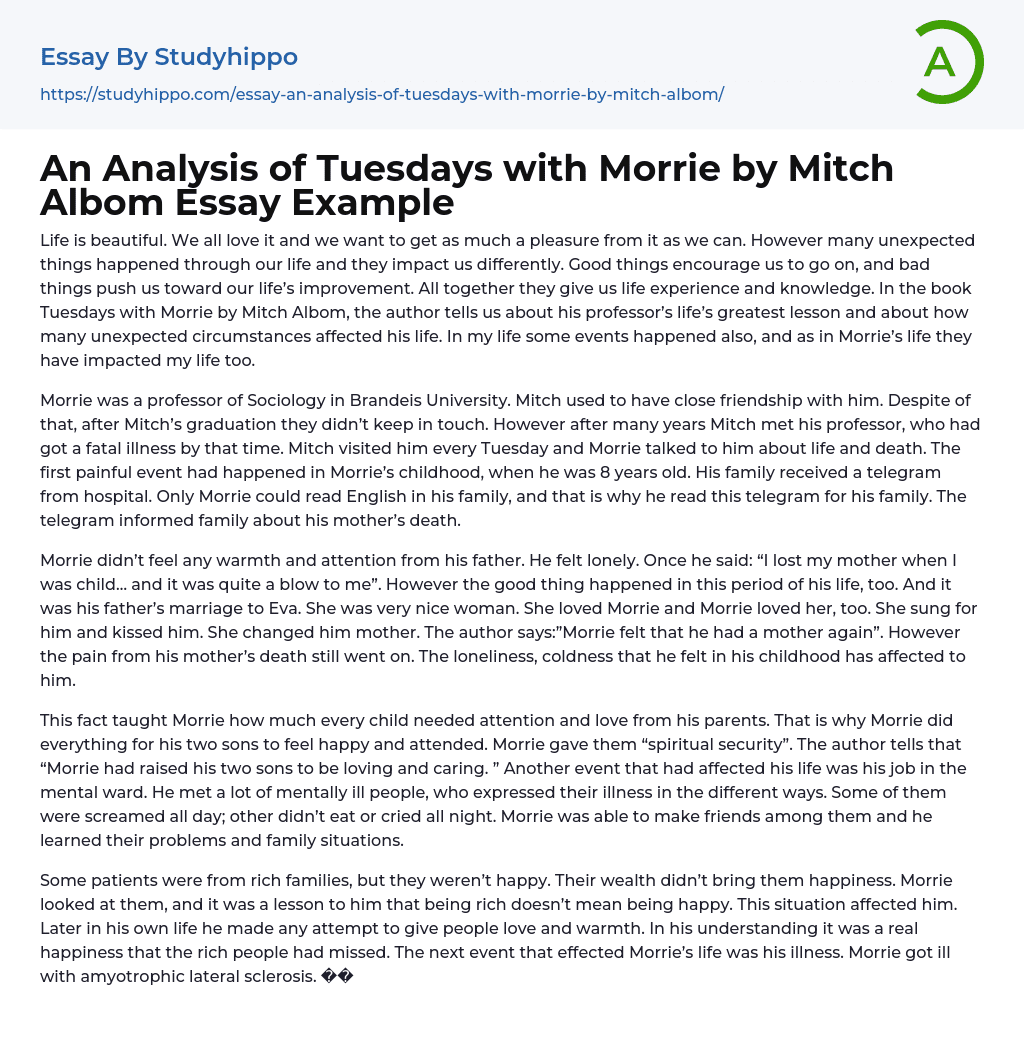

An Analysis of Tuesdays with Morrie by Mitch Albom Essay Example
Life is a remarkable phenomenon that we all treasure and seek to draw the utmost happiness from. However, many unexpected incidents happen throughout our existence, influencing us in diverse ways. Positive events encourage us to keep moving ahead, while adverse ones motivate us to aim for improvement in our lives. These combined experiences add up to our overall wisdom and comprehension of life. Mitch Albom, through his book 'Tuesdays with Morrie', imparts the most vital life lesson he learned from his professor and emphasizes the influence of unforeseen situations on his life journey. I have encountered similar episodes in my own life that like Morrie's encounters, have left significant imprints on my existence.
Morrie, a former Sociology professor at Brandeis University, had developed a significant relationship with Mitch, one of his students. The
...y lost contact after Mitch completed his studies. After many years, fate brought them together when Mitch accidentally ran into Morrie who was battling a fatal illness during that period. Every Tuesday became special for Mitch as he started visiting Morrie and they would have deep conversations about existence and mortality. The first encounter Morrie had with suffering dates back to when he was 8 years old; he received a hospital telegram concerning his family. As the only member in his family who could comprehend English, it fell upon him to read out the distressing news of his mother's death.
Morrie did not experience any affection or care from his father, which left him feeling isolated. He once confided, "I lost my mother when I was child... and it really affected me". Nevertheless, a silver lining in this difficult time was his father's marriage to
Eva. Eva was a kind woman who cared deeply for Morrie, and he reciprocated her feelings. She would sing to him and shower him with kisses. In her, Morrie found a replacement for his mother. The author notes, "Morrie felt as though he had regained a mother". However, the anguish from the loss of his birth mother persisted. The feelings of loneliness and emotional coldness that pervaded his childhood had significant impacts on him.
Morrie's experiences underscored the importance of a child's need for attention and love from their parents. Motivated by this understanding, Morrie provided his two sons with everything they required to feel cherished and important, giving them a sense of "spiritual security". It is mentioned by the author that Morrie nurtured his sons to be empathetic and thoughtful. His career in a mental ward also had a major impact on him. He encountered numerous mentally ill individuals, each expressing their condition in unique ways. Some were constantly yelling, while others refused to eat or spent entire nights crying. Despite this, Morrie managed to form friendships with them and familiarize himself with their issues and familial circumstances.
Morrie observed that patients from wealthy backgrounds were not necessarily happy, despite their abundance. Their riches did not bring satisfaction or joy into their lives. From this observation, Morrie came to realize that wealth doesn't automatically mean happiness. This understanding shaped his future actions and he made efforts to extend love and warmth to those around him. He believed this was a crucial component of true happiness, something missed by the affluent patients he had witnessed. Another pivotal moment in Morrie's life was his diagnosis with amyotrophic lateral
sclerosis (ALS). When informed about his condition, he queried the doctor, "So I'm going to die?" The progression of this disease significantly altered his lifestyle.
While he once relished life and held a fondness for dancing, the disease now transformed his behavior, leading him to become static. The room in which he stayed, confined to a wheelchair and from where he observed the surroundings, became his sole reachable space. Although facing his mortality, he still held a unique perspective towards life. Yet, Morrie sustained a favorable outlook upon existence. He once verbalized, “You need to search for what’s wonderful, genuine, and lovely in your current life”. The things that remained beautiful and magnificent in his life at this stage included his cognitions, understanding, and life experiences.
He created several aphorisms from his abundance of thoughts, including "accept what you are capable of and acknowledge what you cannot do". He crafted various saying which he imparted onto his friends. His sickness led him to a greater self-awareness, an understanding of the world and the actual worth of life. It also taught him how to live happily, regardless of the situation. There are instances in everyone's life that hold immense importance, leaving an imprint on our hearts and possibly altering our life's trajectory. Through his life experiences, Morrie learned the art of living and dying, loving others, and caring for his kin.
- Pregnancy essays
- Death essays
- Asthma essays
- Chronic Pain essays
- Diabetes essays
- Infection essays
- Infertility essays
- Pain essays
- Sexually Transmitted Disease essays
- Cholesterol essays
- Epidemic essays
- Pathogen essays
- Symptom essays
- Water supply essays
- Myocardial Infarction essays
- Chronic essays
- Hypertension essays
- Black Death essays
- Breast Cancer essays
- Down Syndrome essays
- Apoptosis essays
- Tuskegee Syphilis Experiment essays
- Type 2 Diabetes essays
- Addiction essays
- Anatomy and Physiology essays
- Biodegradation essays
- Cancer essays
- Dental Care essays
- Disability essays
- Disease essays
- Disorders essays
- Health Care essays
- Infectious Disease essays
- Inquiry essays
- Intelligence Quotient essays
- Lung Cancer essays
- Medicine essays
- Neurology essays
- Nutrition essays
- Olfaction essays
- Physical Exercise essays
- Public Health essays
- Sex essays
- Women's Health essays
- World health organization essays
- 1984 essays
- A Farewell to Arms essays
- A Good Man Is Hard to Find essays
- A Hanging essays
- A Lesson Before Dying essays



